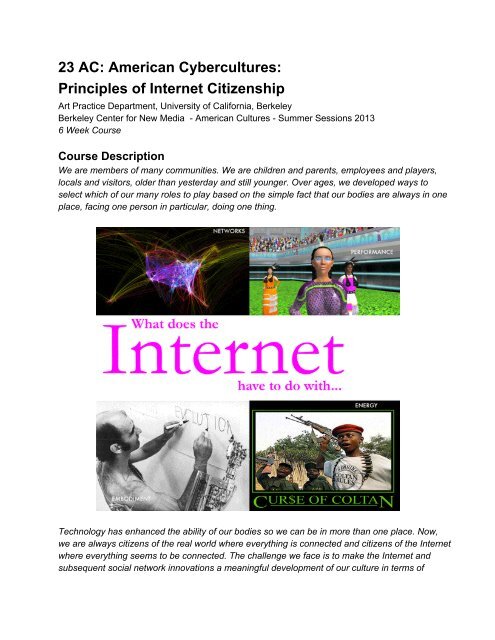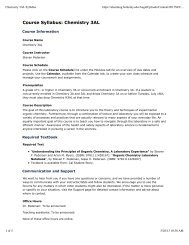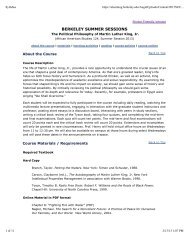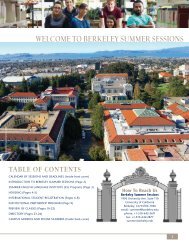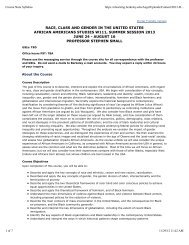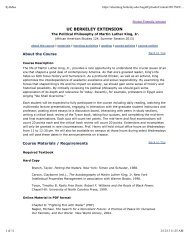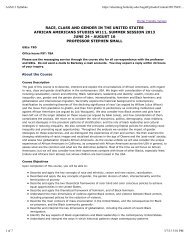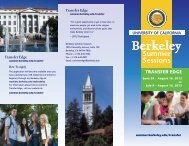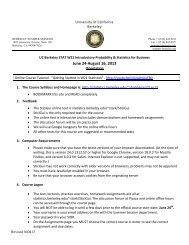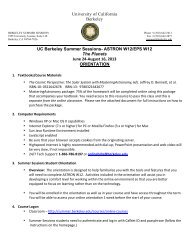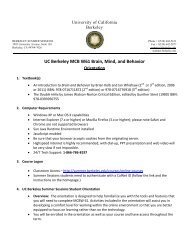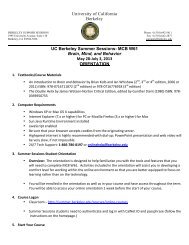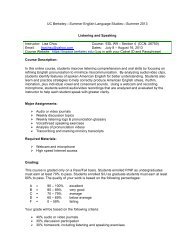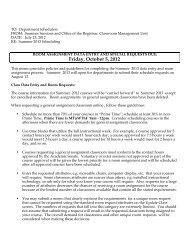Syllabus - Berkeley Summer Sessions - University of California ...
Syllabus - Berkeley Summer Sessions - University of California ...
Syllabus - Berkeley Summer Sessions - University of California ...
You also want an ePaper? Increase the reach of your titles
YUMPU automatically turns print PDFs into web optimized ePapers that Google loves.
23 AC: American Cybercultures:<br />
Principles <strong>of</strong> Internet Citizenship<br />
Art Practice Department, <strong>University</strong> <strong>of</strong> <strong>California</strong>, <strong>Berkeley</strong><br />
<strong>Berkeley</strong> Center for New Media American Cultures <strong>Summer</strong> <strong>Sessions</strong> 2013<br />
6 Week Course<br />
Course Description<br />
We are members <strong>of</strong> many communities. We are children and parents, employees and players,<br />
locals and visitors, older than yesterday and still younger. Over ages, we developed ways to<br />
select which <strong>of</strong> our many roles to play based on the simple fact that our bodies are always in one<br />
place, facing one person in particular, doing one thing.<br />
Technology has enhanced the ability <strong>of</strong> our bodies so we can be in more than one place. Now,<br />
we are always citizens <strong>of</strong> the real world where everything is connected and citizens <strong>of</strong> the Internet<br />
where everything seems to be connected. The challenge we face is to make the Internet and<br />
subsequent social network innovations a meaningful development <strong>of</strong> our culture in terms <strong>of</strong>
overcoming injustices and exclusions. We examine how diverse race, ethnic and identity<br />
conditions affect social acts online, and we study how these online performances reconstitute<br />
real world experiences. Do New Media bring new justice? For whom, at what cost, and in which<br />
ways? Who can change New Media for the better? Can we, as Internet Citizens, create a civic<br />
space which serves broad needs?<br />
Internet Citizenship is a new form <strong>of</strong> belonging based on participation in a global network <strong>of</strong><br />
information, rather than by location or nationality alone. Internet citizenship facilitates<br />
communication, connection and sharing. This course seeks to educate students in historical,<br />
political, and practical aspects <strong>of</strong> the Internet in order to transform our students from users to<br />
active citizens. In this course, we propose 23 principles <strong>of</strong> Internet Citizenship as tools to<br />
help us choose how best to be in more than one place at a time, or how to be responsible, active<br />
citizens <strong>of</strong> networked communities.<br />
This will be conducted mostly online [http://login.uconline.edu]. Our learning units are called<br />
missions. Each mission corresponds to one <strong>of</strong> the 23 Principles <strong>of</strong> Internet Citizenship.<br />
In this course you will critique the concepts <strong>of</strong> Internet Citizenship and gain digital media skills in<br />
the areas <strong>of</strong> file sharing, image and video upload, image and video editing, web design, game<br />
and app design and Internet storage.<br />
Course Instruction:<br />
Instructor <strong>of</strong> Record: Greg Niemeyer, Ph.D. Dept <strong>of</strong> Art Practice<br />
<strong>Berkeley</strong> Center for New Media<br />
Text: Mitchell, W. J. T., & Hansen, M. B. N. (2010). Critical Terms for Media Studies. Chicago:<br />
The <strong>University</strong> <strong>of</strong> Chicago Press.<br />
Tech requirements:<br />
1. You will need access to a computer with fast Internet capabilities, a Web cam, AND an<br />
audio headset with mic for online discussions.<br />
2. Know how to use a free email service like gmail, otherwise... no special tech knowledge<br />
is required!<br />
Course Requirements<br />
This course emphasizes creativity and collaboration, through lessons that mimic achievements<br />
in online games, and learning. Our aim is show how forms <strong>of</strong> play can be productive and to<br />
capitalize on technology’s ability to facilitate innovation and cooperation. Grading will consist <strong>of</strong><br />
assignment completion, but achievement will be tied to acquisition <strong>of</strong> mission roles in the virtual<br />
classroom.
Grading<br />
Grade Elements<br />
Final project<br />
Final exam<br />
Engagement Index<br />
Total Grade<br />
Points<br />
20 % <strong>of</strong> final grade<br />
20 % <strong>of</strong> final grade<br />
60 % <strong>of</strong> final grade<br />
100 pecent<br />
Missions/Assignments<br />
Learning units in this course are called ‘missions.’ You will need to complete at least one<br />
mission before the start <strong>of</strong> class each day. Each will consist <strong>of</strong> the following elements tasks:<br />
● View a video lecture<br />
● Read and view required text and artwork<br />
● Complete Assignment<br />
● Interact online with your peers<br />
Upon completion <strong>of</strong> the course lecture and the accompanying readings, students will engage in<br />
the mission assignment that <strong>of</strong>ten requires an individual or collaborative art project.<br />
23 Principles/Learning Missions<br />
The 23 Missions address the topics listed below.<br />
01: Identity<br />
02: Energy<br />
03: Network<br />
04: Subversion<br />
05: Abstraction<br />
06: Performance<br />
07: Frequency<br />
08: Deterritorialization<br />
09: Sorting<br />
10: Capture<br />
11: Privacy<br />
12: Aggregation<br />
13: Diffraction<br />
14: Transparency<br />
15: Adoption
16: Neutrality<br />
17: Relevance<br />
18: Manipulation<br />
19: Participation<br />
20: Subculture<br />
21: Simulation<br />
22: Disembodiment<br />
23: Storage<br />
Discussion<br />
The meetings for this class will all take place online via via video chat (Google Hangouts).<br />
Discussion will drive classroom sessions daily, as lectures are online. Each student is required<br />
to come to discussion time prepared to present for 5 minutes on the mission that they<br />
completed for homework. Additionally, you will have to bring at least one question concerning<br />
your coursework and be prepared to share critiques <strong>of</strong> fellow students’ artwork and remarks.<br />
Discussions for this course will take place via video chat.<br />
Participation: Engagement Index<br />
Internet Citizenship is about active collaboration and communication.<br />
An Engagement Index* is provided under your main pr<strong>of</strong>ile in the course site to help you<br />
measure this interaction. The engagement index measures your level <strong>of</strong> participation in this<br />
course including: comments on colleagues’ work, responses to readings and lectures,<br />
questions, answers, +1s, and other online interactions. Active collaboration in classroom<br />
discussion and on the Website is required to complete each mission, but don’t wait for others to<br />
start your assignments. The index is worth 60% <strong>of</strong> your grade.<br />
Internet Citizenship Badges!<br />
This course not only allows you to grasp Internet practices, but to practice being an active citizen<br />
<strong>of</strong> the Internet with some rewards. Students earn points per act <strong>of</strong> participation, and can receive<br />
points from other students upon Peer Review <strong>of</strong> their assignments.<br />
Achieving more participation points (+1s and comments) gets you closer to a mission role:<br />
Citizen or Innovator. These roles unlock certain privileges specific to the unit, as follows:<br />
●<br />
●<br />
○<br />
Citizen badge Upon completing all activities in a mission, including participation in the<br />
form <strong>of</strong> comments and +1s, you earn the role <strong>of</strong> citizen and complete that mission.<br />
Innovator badge Upon receiving 10 additional participation points (+1s and comments)<br />
in a mission, you earn the role <strong>of</strong> innovator for that mission and the privilege to create an<br />
alternative assignment for your classmates.<br />
Example: Reggie’s ‘Identity’ project receives ten +1s from his classmates unlocking the
ability for Reggie to create his own assignment. Students can now earn the Instructor’s<br />
Identity badge, or Reggie’s Identity badge.<br />
Community badges: By Week II, we will begin to implement an ‘Open Source’ badging system:<br />
Students will unlock the ability to grant their own Community badge to be given and achieved in<br />
ways devised by students and their peers. Community badges are a fun way <strong>of</strong> challenging and<br />
rewarding your colleagues.<br />
Assignments<br />
● Daily Missions should be completed by the beginning <strong>of</strong> each discussion meeting.<br />
Final Project<br />
Students will work in groups and present a new media solution to a social problem. For example,<br />
solutions can consist <strong>of</strong> websites, mobile devices, meet ups, performances, installations,<br />
games, web services, social apps, and any projects in the physical world. This summer will be<br />
partnering with the local organization, CodeforOakland.com in order to identity local problems in<br />
physical communities.<br />
Final Exam<br />
Students will complete a final exam with 510 questions. The exam will be administered online,<br />
and students will have to complete the exam in a time frame <strong>of</strong> 2 hours. The exam is “open<br />
book” so students may consult any text or the Web during the exam. The grading emphasis is<br />
on accuracy, quality <strong>of</strong> analysis and originality <strong>of</strong> argumentation.<br />
Open Source Disclaimer<br />
All student content produced through “23 Principles <strong>of</strong> Internet Citizenship” is considered “open<br />
source” — ideas and projects that are meant to be shared and available to those engaged in the<br />
course, with no reasonable expectation that students retain intellectual property rights. Students<br />
will work with instructors to collaboratively build course content. Students and instructors may<br />
use and build on each others’ ideas for future educational and personal use.<br />
Attendance: Students are required to attend class online each day. Unexcused absences will<br />
negatively impact your participation grade.<br />
Email Policy:<br />
We will respond to email once per day, MondayFriday only. The function <strong>of</strong> email is for<br />
scheduling a meeting or discussing an emergency situation only.<br />
Grade Dispute Policy:<br />
If a student feels the need to dispute a grade, send an email outlining your reasons for disputing<br />
the grade. This may result in a raising OR lowering <strong>of</strong> the grade in question.
Academic honesty: Plagarism, cheating, and other forms <strong>of</strong> academic dishonesty will not be<br />
tolerated. Plagiarism involves presenting other people’s ideas as your own without citing the<br />
appropriate source. Please review the university policy on academic honesty:<br />
http://students.berkeley.edu/osl/sja/asp?id=983&rcol=1202 If you have any questions about the<br />
policy, or about how to avoid academic dishonesty, please email us.<br />
Instructor <strong>of</strong> Record: Graduate Student Instructors, are teaching this class under the<br />
supervision <strong>of</strong> a full faculty member, called an Instructor <strong>of</strong> Record. In this case, Pr<strong>of</strong>. Greg<br />
Niemeyer from the Department <strong>of</strong> Art Practice is the Instructor <strong>of</strong> Record.<br />
Accommodations for students with disabilities: With a letter from the Disabled Students<br />
Program (http://dsp.berkeley.edu) detailing your situation we will be adequately prepared and<br />
more than willing to discuss and make any appropriate arrangements.<br />
START > http://login.uconline.edu


